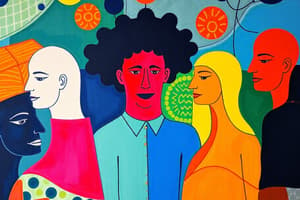Podcast
Questions and Answers
What does social structure primarily refer to?
What does social structure primarily refer to?
- The set of beliefs and values shared by a society
- The individual processes through which people internalize behaviors
- The organized pattern of relationships and institutions in society (correct)
- The shared customs and artifacts within a culture
Which aspect of culture involves physical objects that people create?
Which aspect of culture involves physical objects that people create?
- Social stratification
- Material culture (correct)
- Non-material culture
- Socialization
What is the main purpose of socialization in sociology?
What is the main purpose of socialization in sociology?
- To instill societal norms and behaviors (correct)
- To separate individuals from group dynamics
- To develop individual personalities
- To externalize personal values
Which type of group is characterized by impersonal relationships?
Which type of group is characterized by impersonal relationships?
What does the term deviance refer to in sociology?
What does the term deviance refer to in sociology?
Which of the following factors typically contributes to social change?
Which of the following factors typically contributes to social change?
What does functionalism primarily focus on within society?
What does functionalism primarily focus on within society?
Which theoretical perspective emphasizes the role of inequalities in shaping social relations?
Which theoretical perspective emphasizes the role of inequalities in shaping social relations?
Flashcards are hidden until you start studying
Study Notes
Overview of Sociology
- Sociology is the study of society, social relationships, and social institutions.
- It examines patterns of social behavior, cultural norms, and the influences of social structures.
Key Concepts in Sociology
-
Social Structure
- The organized pattern of social relationships and social institutions that together constitute society.
- Includes hierarchies, roles, and social networks.
-
Culture
- Shared beliefs, values, customs, behaviors, and artifacts that characterize a society.
- Consists of material (physical objects) and non-material (ideas, norms) culture.
-
Socialization
- The process through which individuals learn and internalize the values, norms, and behaviors necessary to function in society.
- Agents of socialization include family, schools, peers, media, and religion.
-
Group Dynamics
- Examines how individuals behave in groups and the influence of group membership on behaviors and attitudes.
- Types include primary groups (close, personal relationships) and secondary groups (larger, impersonal relationships).
-
Social Stratification
- The hierarchical arrangement of individuals in society based on factors such as wealth, power, race, education, and status.
- Examines inequality and social mobility.
-
Deviance
- Behavior that violates societal norms and expectations.
- Theories of deviance include strain theory, labeling theory, and differential association theory.
-
Social Change
- The transformation of culture and social institutions over time.
- Factors leading to social change include technology, social movements, and cultural diffusion.
Research Methods in Sociology
-
Quantitative Methods
- Use of statistical data to study social phenomena. Methods include surveys, experiments, and analyses of existing datasets.
-
Qualitative Methods
- Focus on understanding social phenomena through in-depth interviews, participant observation, and case studies.
Major Theoretical Perspectives
-
Functionalism
- Views society as a system of interconnected parts that work together to maintain stability and social order.
-
Conflict Theory
- Emphasizes the role of power struggles and inequalities in shaping social relations and structures.
-
Symbolic Interactionism
- Focuses on the meanings that individuals ascribe to social phenomena and how these meanings are created and changed through interaction.
Important Sociologists
- Émile Durkheim: Known for his study of social integration and the concept of anomie.
- Karl Marx: His theories focus on class struggle and the socio-economic factors driving societal change.
- Max Weber: Emphasized the importance of understanding subjective meanings and motivations behind social actions.
Applications of Sociology
- Provides insights into various issues including crime, education, health, gender, race, and globalization.
- Utilized in fields such as public policy, social work, and community development to address social issues and promote social welfare.
Overview of Sociology
- Sociology is the study of how people interact and form structures within a society
- It explores how social behavior, cultural norms, and social structures influence each other
Key Concepts in Sociology
- Social Structure
- Societies are organized into structures that influence how people behave
- Social structures include hierarchies, roles, and networks
- Culture
- Culture is shared beliefs, values, and behaviors within a society
- Material culture includes physical objects while non-material culture includes ideas and norms
- Socialization
- Socialization is the process of individuals learning and accepting the norms and values of society
- Agents of socialization include families, schools, peers, and media
- Group Dynamics
- Examines how individuals act within groups and how group membership influences behavior and attitudes
- Types of groups include primary (close, personal relationships) and secondary (impersonal, larger relationships)
- Social Stratification
- Individuals are organized in a hierarchy based on factors like wealth and power
- Examines how inequality and social mobility impact individuals
- Deviance
- Behavior that breaks societal norms
- Theories of deviance include strain theory, labeling theory, and differential association theory
- Social Change
- Refers to the transformation of culture and social institutions over time
- Factors influencing social change include technological advancements, social movements, and cultural diffusion
Research Methods in Sociology
- Quantitative Methods
- Use statistical data to study social phenomena
- Methods include surveys, experiments, and analysis of existing datasets
- Qualitative Methods
- Focuses on in-depth understanding of social phenomena
- Methods used include interviews, participant observation, and case studies
Major Theoretical Perspectives
- Functionalism
- Views society as a system where parts work together to maintain stability and order
- Conflict Theory
- Emphasizes the role of power struggles and inequality
- Symbolic Interactionism
- Focuses on the meanings that individuals assign to social phenomena and how these meanings are created through interaction
Important Sociologists
- Émile Durkheim
- Studied social integration and developed the concept of anomie
- Karl Marx
- Developed theories about class struggle and the socio-economic factors driving societal change
- Max Weber
- Emphasized the importance of understanding subjective meanings and motivations behind social actions
Applications of Sociology
- Offers insights into issues including crime, education, health, gender, race, and globalization
- Utilized in fields like public policy, social work, and community development to understand social issues and drive social welfare
Studying That Suits You
Use AI to generate personalized quizzes and flashcards to suit your learning preferences.




